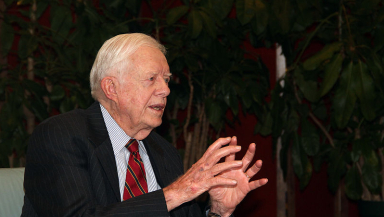
Last week former US President Jimmy Carter spoke in favour of gay rights at an event at Grand Rapids Community College. He declared: "I never knew of any word or action of Jesus Christ that discriminated against anyone," and said that "the sexual orientation of a person is just like the colour of their skin, or whether...they are poor or rich."
I don't know exactly what President Carter meant by his comments, and whether he was just defending the civic rights of LGBT people, or whether he was insisting that the Christian church should abandon its traditional teaching that sex is exclusively for heterosexual marriage and welcome those in gay sexual relationships into the body of Christ.

Whatever he might have meant, his comments highlight a common mantra that underlies the arguments of many of those, including some self-proclaimed evangelicals, who claim that the church should stop excluding people in committed same-sex sexual relationships. They argue that it is wrong to "discriminate" against people on the grounds of the sexual orientation, and that to do so is to fail to follow the example of Jesus. It is closely linked to the other common claims that Jesus never judged anyone, and that Jesus accepted people just as they were.
This argument is powerful because "discrimination" has come to be regarded as something akin to a mortal sin in modern western societies. Those who insist on the right to discriminate will inevitably be branded as guilty of some socially unacceptable –ism or –phobia. To discriminate is perceived as both unfair and an attack on a person's identity and value.
However it is overly simplistic to assume that Jesus never discriminated against anyone, and that this is the basis upon which the church should determine its beliefs and practices. The root concept of "discrimination" is to distinguish or differentiate. In many cases it is a positive virtue to be "discriminating". The Bible demands that God's people practice discrimination. The very idea of holiness demands discrimination, between what is clean and what is unclean. The Old Testament law was given to enable the people of Israel to make such distinctions in every area of their lives. The New Testament letters similarly demand that the church draw distinctions. It is commanded to discriminate against false teaching and false teachers (1 Timothy 1:20), and to exercise discipline against those who refuse to repent of their sin, especially sexual sin, by excommunicating them from membership of the assembly (1 Corinthians 5v1:5). Baptism is only to be offered to those who repent and believe, and the Lord's Supper is a covenant meal for believers.
When we look closely at the ministry of Jesus we discover that he continues to distinguish between people, but he radically changes the basis on which such discrimination is to be exercised. He comes to fulfil the symbolic elements of the Jewish law, so that it is no longer appropriate to discriminate against people on the basis of their race or ethnicity and by whether they keep the ceremonial aspects of the law, including the food laws, Sabbaths and circumcision. He made clear by his words and action that it was not intrinsically sinful to associate with sinners, with the result that he was criticised by the religious leaders for being willing to eat and drink with them (Luke 6:27-31). He taught that God commanded his people to love their neighbours, and also their enemies, and so they should be willing to help and assist them in their need, irrespective of their ethnicity or lifestyle.
However Jesus came to preach the good news of the Kingdom of God, and to call men and women to repentance and faith (Mark 1:15). He offered the hope of salvation and forgiveness to everyone and anyone, but this did not mean that he accepted them just as they were. He called prostitutes, adulterous women, abusive tax collectors, self-righteous religious conservatives, radical jihadist terrorists, rich bankers and poor beggars alike to take up their cross and follow him. He had harsh words to speak to those who refused to repent and he refused to admit them into the company of his disciples. He turned away a rich young ruler who would not sell his possessions and give to the poor (Matthew 19:16-22). His kingdom has no room for the hypocritical Pharisees and Teachers of the Law, who honoured God with their lips and were far from him in their hearts (Matthew 23:13-38). He discriminated against the thief on the cross who continued to insult him as he died for the sins of the world, and only offered the hope of paradise to the thief who recognised him as king (Luke 23:32-43). He taught his disciples that they should put their commitment to each other ahead even of their ties to their own kith and kin (Matthew 10:34-39. His proto-church was a gathering of those who had repented and turned from their sin and put their faith in him. The women caught in adultery was not simply accepted as she was, but sent on her way with the command "Go now and leave your life of sin" (John 8:11).
Jesus refused to countenance any discrimination regarding membership of his kingdom on grounds of race, age or gender. All were welcomed on an equal basis. However he practised what we would call discrimination and exclusion on the basis of sin and unbelief, criteria that can be applied equally to the entire human race. The good news of the gospel is offered equally to all without discrimination, but only those who respond to it with repentance and faith are accepted into the kingdom. The early church was following faithfully in his footsteps when they discriminated between believers and unbelievers, the baptised and the unbaptised, and the repentant and the wilfully sinful.
It may same seem counter-intuitive and offensive that Christians are called to discriminate, just as Jesus did, but it is vital that they do so on the right basis. They are not called to discriminate against people just because they are gay and struggle with same-sex attraction. The issue is not homosexuality in itself but sin. The church must love and preach the gospel to all LGBT people, but it cannot accept those who refuse to recognise and repent of their sin as brother and sister members of the body of Christ, any more than it should accept those who are committing adultery, fornication, refusing to pay the fair wages of their workers or cheating in business (1 Corinthians 6:7-10). Somewhat ironically it is often those who demand that the church cease to discriminate on grounds of sexuality that are most vociferous in demanding that the church discriminate against the rich and powerful, and who believe that Jesus had a bias towards the poor.
The arguments about how the church should respond to the reality of homosexuality in contemporary culture, especially given the civic acceptance of same-sex marriage, will continue. What ought to be clear is that it cannot be resolved by simplistic demands to end "discrimination". The church has always had to discriminate, just as Jesus discriminated. The real question is whether we are discriminating for the right reasons.
John Stevens is the national director of the Fellowship of Independent Evangelical Churches.














